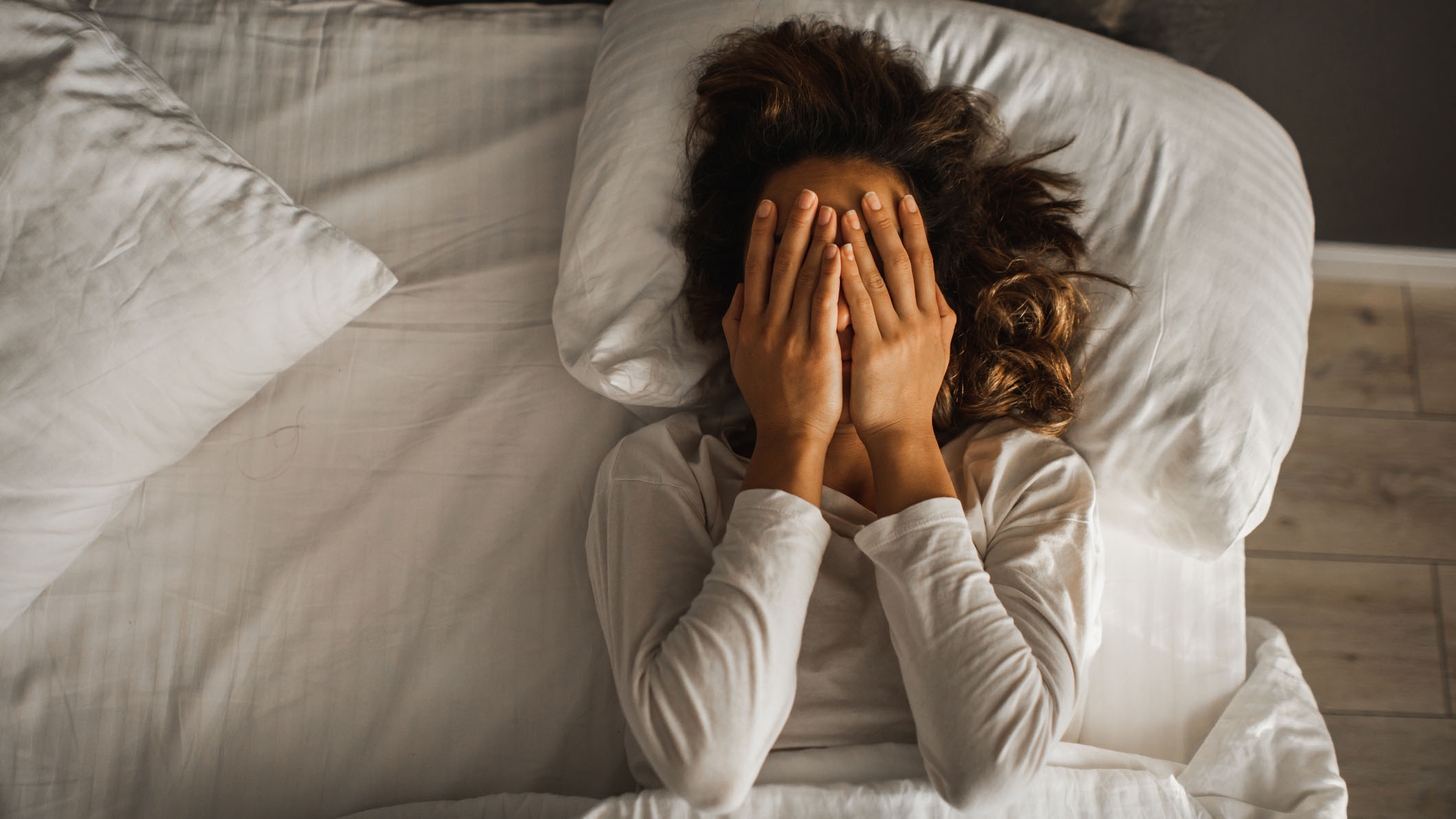
‘Why can’t I sleep’ used to be my go-to question to anyone who’d listen. Several years ago I was gripped by insomnia and unable to sleep at night – I'd manage 30 minutes here or there, but nothing substantial. Daytime naps were a no-go too, so I was stuck in this weird place of feeling utterly exhausted but unable to drop into a deep sleep. It was an horrendous period in my life.
If you find yourself Googling ‘why can’t I sleep?’ on a regular basis, I’m here to share my experience with this exact same thing – and more importantly, the seven common culprits lurking behind most peoples’ inability to sleep.
While most of us should be able to get back to better sleep with a few simple lifestyle changes and a good bedtime routine, others may need professional help. For example, you might need to speak to a doctor of sleep medicine or a chartered psychologist who specialises in the treatment of sleep disorders such as insomnia. I ended up needing CBTi and that, coupled with a few methods I share below, helped me beat insomnia and get back to sleeping better every night.
What you sleep on makes a difference too, so make sure you're sleeping on the best mattress for your body and sleep needs.
‘Why can’t I sleep?’ 7 common reasons from an ex-insomniac
1. Your sleep routine is erratic
Getting up at the same time every day and going to bed at roughly the same time every night has a powerful effect on helping you get a good night’s sleep. Most people give up on this too soon though as it isn’t a quick-fix – it takes around a month for this habit to pay off.
But by sticking to regular bedtime and wake times (especially a consistent wake up time), you’re training your brain to expect sleep at a specific time of the night. Don’t fall into the trap of thinking you need eight hours’ sleep either – some people (depending on age, health, occupation and fitness levels) need around 7.5 hours, while others, like me, need upwards of nine.
The fix: Go to bed and wake up at the same time every day.

2. You’re not getting enough daylight
Science tell us that light is important to our circadian rhythm (internal body clock). At night bright lights are best avoided because they can stop the production of melatonin (the sleepy hormone). But first thing in the morning you should expose yourself to as much natural daylight as possible to cue your brain that it’s time to be awake.
If you wake up very early for shift work and it’s still dark outside, you can fake daylight with a sunrise alarm clock and a powerful SAD lamp. Use the sunrise clock to wake you up (it will create a faux sunrise effect in your bedroom), then sit near the SAD lamp for 30 to 60 minutes every day. For example, while you’re eating breakfast or working at a desk.
I used both during my battle with insomnia, but I particularly loved the SAD lamp – mine had a 10,000 lux output and I'd position it around 16” to 24” away from me.
The fix: Go for a walk every morning to strengthen your circadian rhythm.
3. You’re napping too much in the day
According to guidance published by the CDC, our brains benefit from napping. We feel more alert afterwards and have a boost of energy. But lengthy daytime naps, or too many micro naps, decrease your sleep hunger (urge to sleep) at night so you’ll take longer to drop off.
20 minutes is the ideal length of time for a short daytime nap because you’ll avoid feeling groggy (sleep inertia) upon waking. If you have the time and your bedtime is several hours away, you could try a 90-minute nap (one whole sleep cycle), as sometimes being overtired makes it difficult for us to fall asleep at night too. So a good longer nap in the day could weirdly help you fall asleep easier at night.
The fix: Experiment with one short or one long nap, several hours before bedtime, to see if either helps you sleep better at night.
4. You’re too hot to fall asleep
My insomnia was compounded by feeling too hot in bed. So I got really forensic with my PJs, bedding and the type of mattress I was sleeping on, and in the end I made some pretty big changes in order to sleep cooler.
I swapped to breathable, lightweight bamboo nightclothes, slept on a hybrid mattress (a memory foam bed with coils for added airflow and better temperature regulation), and used a smart thermostat to keep the room temperature to 65 degrees Fahrenheit / 18 degrees Celsius.
The fix: Switch to breathable fabrics and a cooling mattress.
5. You smoke or drink coffee close to bedtime
Before I trained as a Certified Sleep Science Coach, I was aware that caffeine affected sleep but I didn’t realise that some people were far more sensitive to it than others. Unfortunately I’m one of those people – if I have a caffeinated drink after noon, I’ll have trouble falling asleep come my usual 9pm bedtime. Caffeine has a half-life of five to 9.5 hours depending on your susceptibility to it, so you may have to experiment with this one.

Smoking is another culprit. Research shows that nicotine is a stimulant that delays you falling asleep by up to 25 minutes – that’s long enough to make you think you have trouble falling asleep when you don’t. Quitting is worthwhile for your overall health, not just sleep.
The fix: Don’t consume caffeine at least eight hours before bed.
6. You feel anxious, wired or stressed
The root of my insomnia was work worries – I was stressed out by my old job and all that stress and anxiety about work played on a loop in the back of my mind. I wasn’t making time to deal with it during the day either as I was too busy doing the job I was stressed about, so all of that worry followed me into bed at night.
When I started CBTi, I set aside time every day for ‘active worrying’. I would focus on my anxious thoughts and stress, come up with one action point for that day, then park it. I did this in the afternoon and away from my bedroom to avoid associating my sleep space with worry. This method started working after just a few nights.
The fix: Set aside 10 minutes a day for ‘active worrying’ outside the bedroom.
7. Too much screen time right before bed
Blue light disrupts the production of melatonin, and a small trial focusing on the effects of blue light on insomniacs shows that the use of amber glasses may offset the effect of blue light on sleep. Switching your devices to night mode and wearing amber or orange lens glasses might make the difference for you at night.
But if you’re following proper sleep hygiene, you’ll stop using any digital screens around an hour before bed to give melatonin levels a chance to rise. Sadly that includes watching TV or using your phone. I used to binge watch TV before bed, but now I use that time to dim the lights, have a relaxing bath, read a book and finish with some calming breathing exercises for sleep.
The fix: Ditch screens an hour before bed or use night mode and amber glasses.







